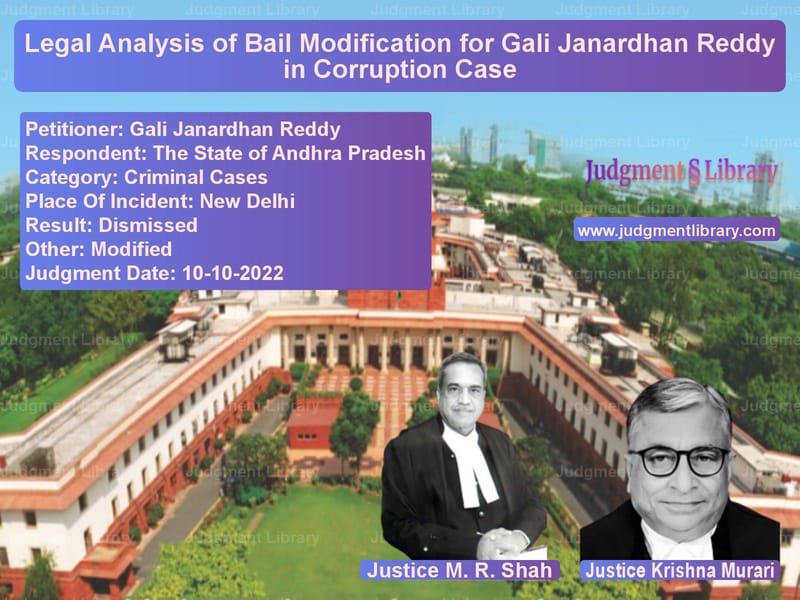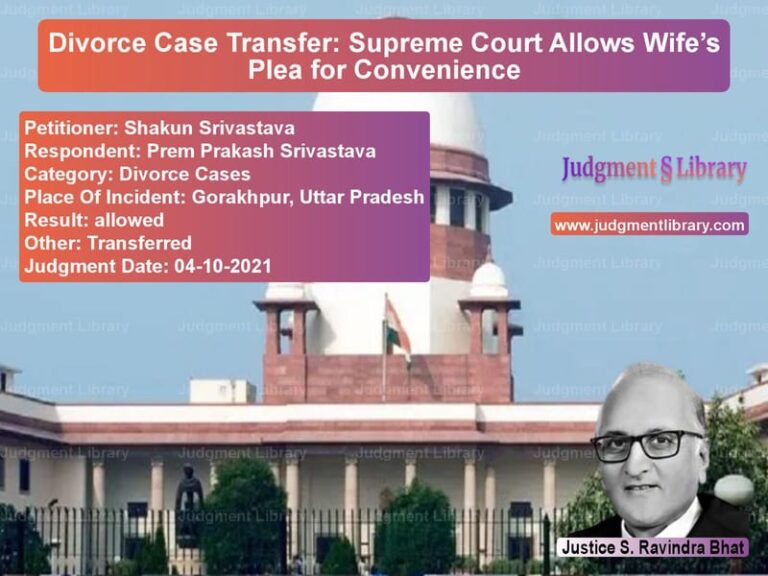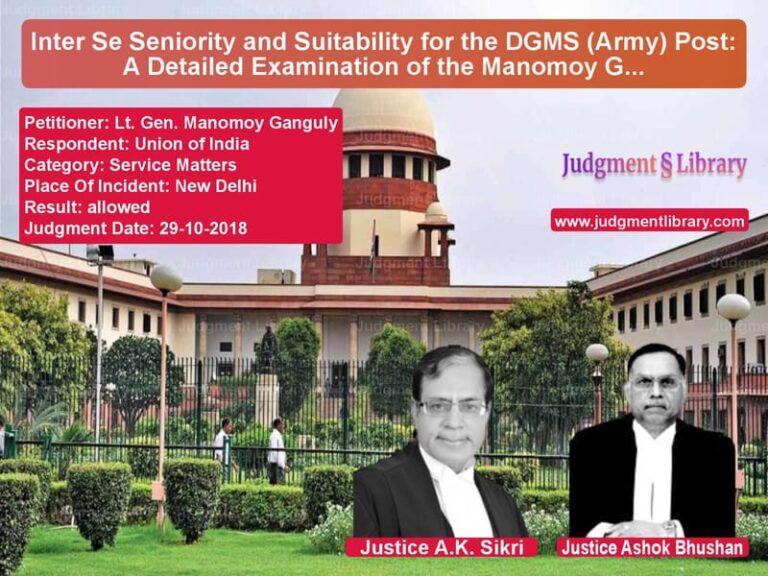Legal Analysis of Bail Modification for Gali Janardhan Reddy in Corruption Case
The case involving Gali Janardhan Reddy, a prominent political figure, highlights key issues regarding bail conditions, trial delays, and the influence of powerful individuals on legal proceedings. Reddy, facing serious charges of corruption, mining violations, and other criminal offenses, approached the Supreme Court seeking a modification of the bail conditions imposed on him. These conditions, initially set in 2015, prohibited him from entering certain districts in Karnataka and Andhra Pradesh. The legal battle revolves around whether these restrictions should be lifted, considering the applicant’s good behavior over the past years, and the trial’s continuing delay.
Factual Background
Gali Janardhan Reddy is accused in a high-profile case involving corruption and illegal mining activities. In 2011, the Central Bureau of Investigation (CBI) arrested him for violating several provisions under the Indian Penal Code, the Indian Forest Act, and the Mines and Minerals (Development and Regulation) Act, 1957. His case became notorious not only for the serious allegations but also because of his influential political connections and the perceived power he held in certain districts of India.
The applicant, after multiple failed attempts at securing regular bail from the trial court and the High Court, approached the Supreme Court in 2013. In January 2015, the Court granted bail to Reddy, subject to specific conditions. One of the key conditions of this bail order was that Reddy should not enter the districts of Bellary in Karnataka and the districts of Ananthapuram and Cuddapah in Andhra Pradesh, areas where his political and business influence was significant. These restrictions were placed to prevent him from tampering with witnesses or influencing the ongoing investigation.
Petitioner’s Arguments
Reddy, through his counsel, requested the Supreme Court to modify these conditions, particularly the restriction on entering the districts of Bellary, Ananthapuram, and Cuddapah. His legal team argued that over the past several years, Reddy had adhered to all the conditions set forth by the Court, including cooperating with the investigation and trial proceedings. Furthermore, they argued that the trial had faced delays not due to any fault of Reddy, but because of the multiple discharge applications filed by the accused, which had resulted in slow progress.
In support of this request, the petitioner’s counsel highlighted that Reddy had made multiple visits to Bellary in the past with prior permission from the Court and had never violated any of the conditions. Additionally, the applicant’s counsel pointed out that Reddy’s daughter had recently given birth and was residing in Bellary, requesting temporary permission for him to stay in the district to assist his daughter during her recovery.
Read also: https://judgmentlibrary.com/appeal-allowed-in-murder-conviction-case-key-court-insights/
Respondent’s Arguments
On the other hand, the CBI, representing the state’s interests, strongly opposed the modification of the bail conditions. They contended that Reddy’s influence in these districts remained significant, and lifting the restrictions would pose a serious threat to the witnesses involved in the case. The CBI argued that Reddy had already attempted to influence judicial officers and witnesses in the past, and there was a real risk of further attempts to undermine the trial process.
Furthermore, the CBI emphasized that the delay in the trial was not caused by any external factors but by the applicant’s own actions, such as filing discharge applications and causing unnecessary delays in the judicial process. The prosecution maintained that modifying the bail conditions would likely impede the fair progress of the trial and could allow Reddy to exert undue influence in the areas where the witnesses resided.
Key Legal Issues and Court’s Consideration
The primary issue before the Court was whether the bail conditions, specifically the restriction on Reddy’s entry into certain districts, should be relaxed given his behavior over the past years and the ongoing delays in the trial. The Court had to balance Reddy’s rights to personal liberty against the need to protect the integrity of the trial process and prevent witness tampering.
The Court also had to consider the arguments regarding the failure of the trial to proceed in a timely manner. Despite the Supreme Court’s earlier directives to expedite the trial, the proceedings had been stalled due to the accused’s actions, which included filing multiple discharge applications. The Court observed that delays in the trial, especially in a case involving serious allegations, could compromise the interests of justice and undermine public trust in the judicial system.
The Court’s Decision
After hearing the arguments, the Supreme Court rejected the petitioner’s request to lift the restrictions on entering the districts of Bellary, Ananthapuram, and Cuddapah. The Court agreed with the CBI’s concerns about the risk of witness tampering and the influence Reddy could exert in these areas. The Court observed that while Reddy had complied with the conditions for a significant period, there was still a real danger of influencing the trial’s outcome due to his influential status in the regions concerned.
However, the Court did modify the conditions to allow Reddy temporary permission to visit Bellary for a specific period to be with his daughter. This modification was made on compassionate grounds, given the recent birth of his grandchild. The Court also issued strong directions to the trial court, requiring it to commence day-to-day proceedings to expedite the trial and conclude it within six months. The Court noted that any further attempts to delay the trial would be viewed seriously.
Conclusion
This case underscores the delicate balance between ensuring a fair trial and protecting the rights of the accused, while also preventing undue influence on the judicial process. The Supreme Court’s decision to uphold the restrictions on Reddy’s movement reflects its concern for maintaining the integrity of the trial, while the modification allowing temporary visitation rights highlights the Court’s sensitivity to personal circumstances. The Court’s directive to expedite the trial serves as a reminder of the importance of timely justice in high-profile cases.
Petitioner Name: Gali Janardhan Reddy.Respondent Name: The State of Andhra Pradesh.Judgment By: Justice M. R. Shah, Justice Krishna Murari.Place Of Incident: New Delhi.Judgment Date: 10-10-2022.
Don’t miss out on the full details! Download the complete judgment in PDF format below and gain valuable insights instantly!
Download Judgment: gali-janardhan-reddy-vs-the-state-of-andhra-supreme-court-of-india-judgment-dated-10-10-2022.pdf
Directly Download Judgment: Directly download this Judgment
See all petitions in Bail and Anticipatory Bail
See all petitions in Fraud and Forgery
See all petitions in Terrorist Activities
See all petitions in Custodial Deaths and Police Misconduct
See all petitions in Judgment by Mukeshkumar Rasikbhai Shah
See all petitions in Judgment by Krishna Murari
See all petitions in dismissed
See all petitions in Modified
See all petitions in supreme court of India judgments October 2022
See all petitions in 2022 judgments
See all posts in Criminal Cases Category
See all allowed petitions in Criminal Cases Category
See all Dismissed petitions in Criminal Cases Category
See all partially allowed petitions in Criminal Cases Category







